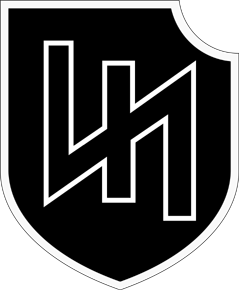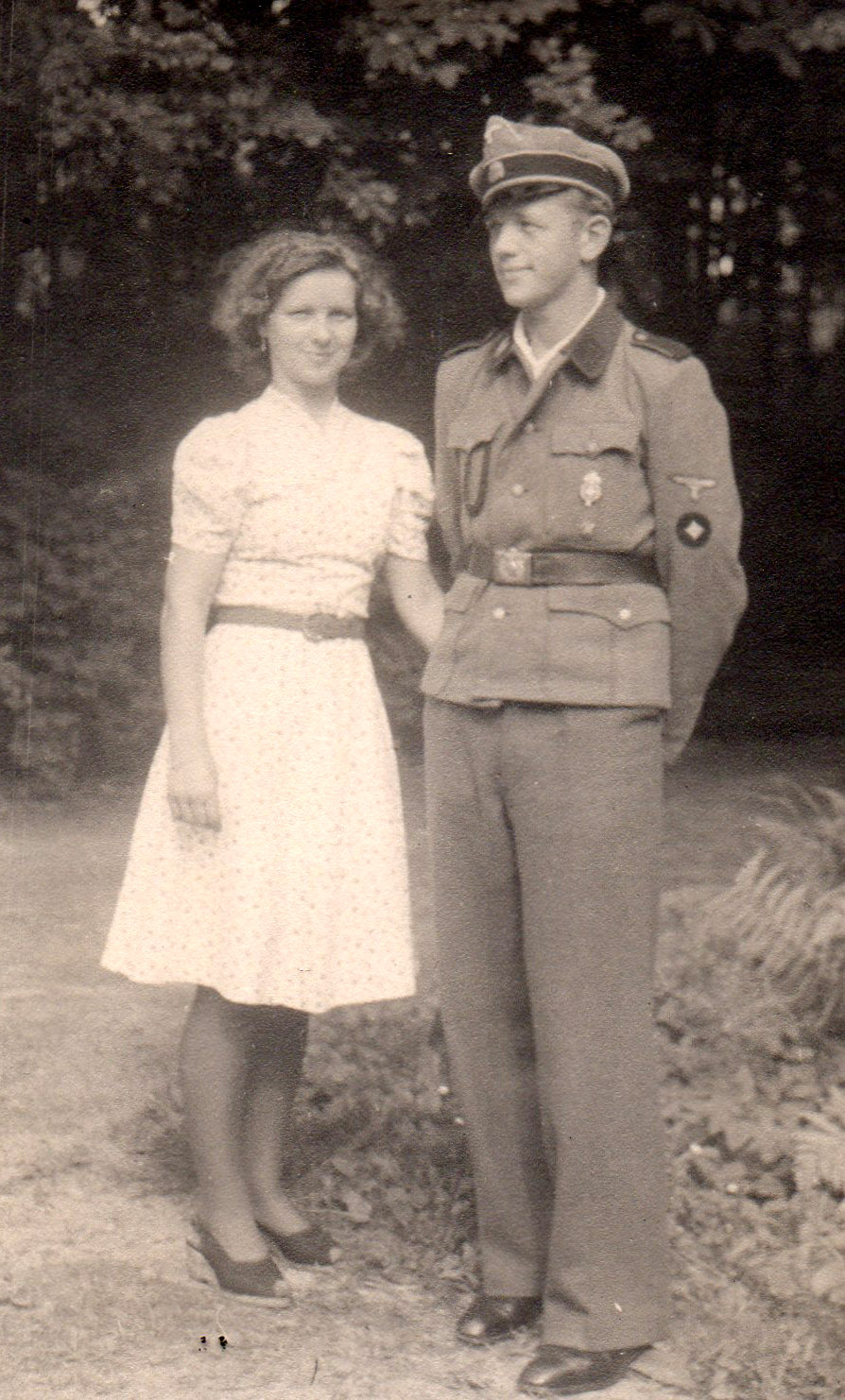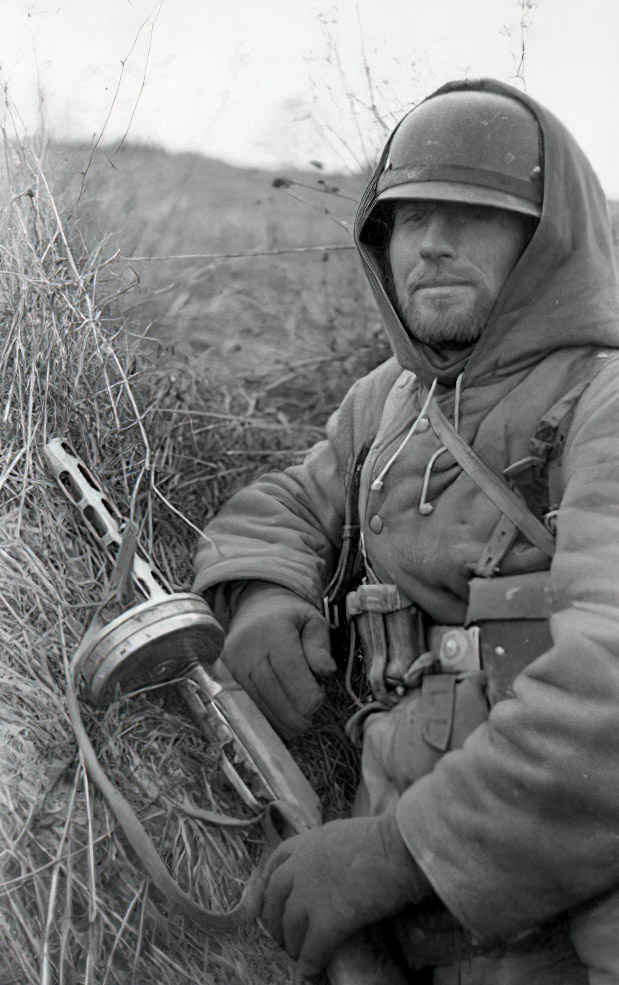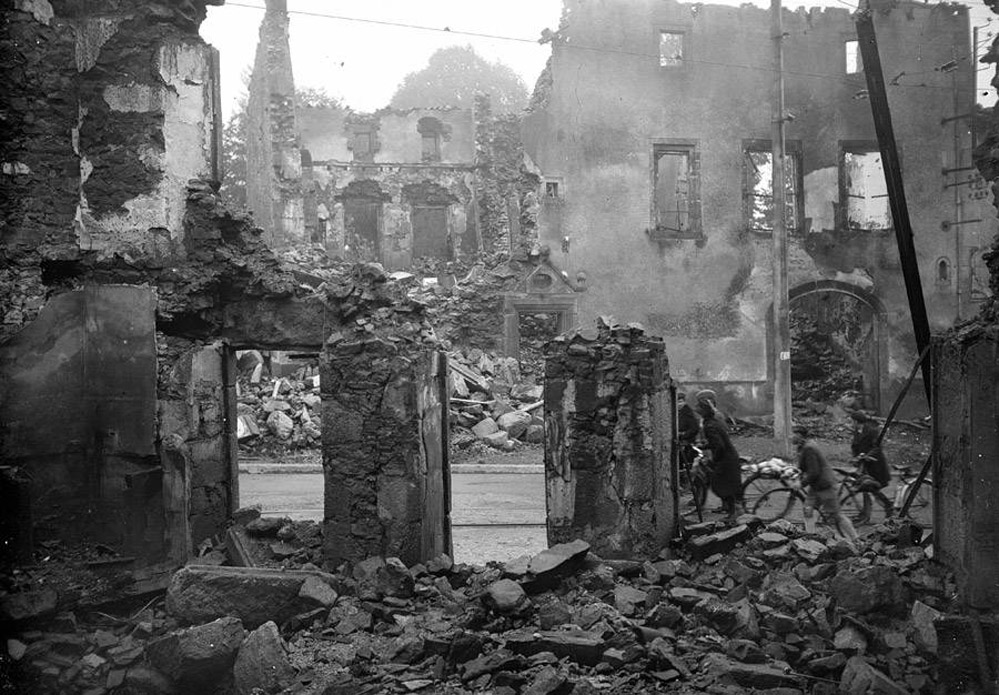

This interview was done in 1998 with Wolfgang F. of the mighty Das Reich Division.
[Above: Wolfgang with young wife, 1940.]



This interview was done in 1998 with Wolfgang F. of the mighty Das Reich Division.
[Above: Wolfgang with young wife, 1940.]

Thanks for agreeing to meet me, I would like to start by asking why you chose the Waffen-SS as your branch of service.
Wolfgang: Very good, I should like to tell you thank you for your interest in German history and being friendly. I can tell you that I served in the 2nd SS Panzer Division Das Reich, and I was active on the eastern front and in Normandy. I am glad to say I had many good comrades whom must not be forgotten.
There were two types of soldiers in the SS, one was a volunteer who asked to come to the SS, and the other was a conscript later in the war. I was a volunteer; I had looked forward to joining the SS since I was younger and still in school. Once I received my certificate I ran down to the recruiter and told them to sign me up.
Of course my parents did not like this, as they wanted me to get a job and to learn a trade, but I was hardheaded and wanted to fight. I was in the local HJ previous to this and got to see some of the military days that we could attend. The SS stood for a firm belief in NS, and I wanted to be a part of a loyal group.
This is not to say the army or anyone else was not loyal, but the SS stood from the beginning as guardians of the movement, and the deeper meanings of NS. The SS was like nothing seen before in the history of the world, we were bearers of our people's future, by taking them back to their past.

I heard a speech by the Reichsfuhrer-SS [Heinrich Himmler] once in which he said the goal of the SS was to bring healing to Germany. The SS was to be used to repair damaged genetics, and rebuild into a healthy nation. He referred to the great loss of the war generation, and fatherless children who were left to turn to bad choices. This caused many problems, for example breeding bad genes, the SS wanted to fix this.
Many people say today this is not correct, and somehow evil. I will say this is health that has been practiced by every healthy society since the beginning. There is nothing wrong with trying to protect your society by only allowing healthy couples to produce what will be healthy children. Even today they speak of IQ drops when healthy, intelligent couples do not conceive.
I liked studying genetics, and it is not hard to understand what Himmler was trying to accomplish. He wanted the SS to be a community to help bring Germany a pure, untainted, and healthy bloodline. He saw through the lies the Jews and their fools told about breeding selection and how unimportant it is. To them this was nothing but a hindrance to love, a false idea that rich men created to stay elite.
The SS was the response to this lie, and sought to show that in nature, selective breeding means everything. We do it to dogs, horses, and cattle, but to humans it means nothing? I am long on my answer but here you have it.
You fought on the Eastern Front, what was it like?
Wolfgang: Ahh Russia, it is a vast nation, that we learned, much like Napoleon, is not easy to beat. I entered Russia with Das Reich and we were part of the center, they wanted us to take Moscow. Das Reich was not a full fledged Panzer division then, we had a good organization but not a lot of combat experience.
Due to this our leaders drilled and drilled us, while in Poland we did many maneuvers so that the Panzers could rely on the infantry for support. Often times the Panzers went too far so that infantry could not stay close.
It was drilled into us that the Panzers had to rely on support so that we did not get swarmed over. We had problems in Russia from early on, we met a mass of Russian soldiers, and they say today they were not planning an attack, but I know better. They all carried fire bombs they could throw at us.
Fire could leak into the Panzer and set something on fire, burning it out. This was true of any vehicle, so infantry had to protect on all sides. In the beginning of the war we caught the Russians by the tens of thousands and sent them to the rear. I remember the supply depots were nice to see as we replenished fuel and food if they did not destroy them.
Our fights started hard, and stayed difficult all through the summer, into December. Das Reich was part of an operation to take Moscow, and our reconnaissance reported seeing the towers of Moscow.
It was here that fresh divisions attacked us and drove us back; we were reduced to almost nothing. It was very cold and miserable. Most of us were wounded, and we had very few working Panzers. It was a miracle that our lines held, and in the spring we were able to regain the offensives.
The Russians were excellent fighters and very well armed, in spite of what they say today, you would think they were backwards idiots who knew nothing of war. I found them to be very warlike and armed to the teeth. I saw a soldier being searched once, and he had 3 pistols hidden on him, and carried 2 PPSh machine pistols [Pistolet-Pulemyot Shpagina 41].
[Below: A German with a captured PPSh, 1943.]

I have read many accounts that say the SS was behind many mass killings, is there any truth to this?
Woldgang: My god no, I feel like we live in a false world, where truth does not exist. We are made out to be criminals by our own government. People seem to not comprehend that we are an occupied nation. Our schools teach what the victors told them was acceptable long ago.
We get no parades, or honors for our service to Germany, the victors sure do. Our children and grandchildren get to look upon the former enemies with honor, and admiration, but for us we are made to be ugly and evil. This is not right, even the Wehrmacht is now starting to feel the wrath of the enemy.

Many barracks bear the names of acceptable heroes from the war, but no one from the former Waffen-SS. I believe someday these will be changed as our enemy is driven by hate. We fought an honorable fight as best as we could.
They like to show pictures of executions and the camps, the Waffen-SS had nothing to do with the camps, we were combat soldiers. In a time of war we served our country and did so with honor. I will tell you what they fail to tell you. Both the Poles and Russians took very bad revenge on the Jews in the east.
Speaking of bandits, I understand you were with Das Reich in France and at Orodour. Can I ask what happened?
Wolfgang: Yes but first I must tell you why we were there. We were in hard fighting at Kursk, which made us need refitting. Most of Das Reich was sent to France to refit which was a welcomed vacation of sorts. We were in the South of France to do this, also it was feared the Allies might invade to cut off Italy. We settled in and began repairing and rebuilding our units.
They never tell you that the Jew was the creator of communism; Marx, Lenin, Trotsky, and Ehrenburg were just the tip of the iceberg. The whole government was formed and run by the Jews. They in turn killed off millions who did not want to go along with them.
When we attacked Russia, from almost day one, we had to witness and stop the attacks. Whole Jewish settlements were destroyed, and it was Germans who restored them. It was so bad, that one reason they went to camps later was to protect them. I had a friend who was a medical person at Birkenau, he told me once, a Pole tried to poison the Jewish inmates because his father died in a gulag.
There were great attacks in the Baltic States, Poland, and in Russia, the people rose up against the Jews who stayed behind. Today these are forgotten, and it is the SS who is blamed, this is wrong. We only dealt with bandits if they attacked us, sometimes they were Jews also, and they were punished if the crime was bad.
There were some resistance activities here as it is very remote, hilly, and forested. It was ideal ground for this type of warfare. The villages were not close by, and isolated. The Vichy government had control, and it was not easy to enforce law in this region. Due to this, many communists came here from all over Europe to hide, especially from Spain and Italy. While most of the French just wanted to be left alone, and ignored these groups, other villages had sympathetic mayors, and aided them.
By March of 1944 there were more attacks happening on German and Vichy units, that Sperrle put out an order that if we were fired on we could punish those found guilty and burn houses if they hid the resistance. It was getting bad, before that the resistance was treated as enemy combatants, and only jailed for acts of resistance and violence.
I will tell you an example, a comrade was in a town I can not remember, and he was attacked while dining at a restaurant. The guilty were caught but the only thing that happened is they were sent to jail. That was all; they tried to kill a German soldier, and only got a slap.
This new order made it so that if this happened they would be shot. It was made to dissuade them from acts against us. Things became quiet after this, until the Allies sent in agents to stir them up. It was right before the invasion when we had phones cut, bridges sabotaged, and rails destroyed.
I would hear distant planes, which today I know were supplying these terrorists. The Milice were brought in to help and they made arrests, but many got away. In June we were ordered to move north to the coast, the invasion had begun. When we started moving out, we heard reports of roadblocks, gunfire, and explosions. All of this was confusing.
Our recon units went first and some of the division took other routes so that we did not bunch up. Some small, under-armed units were attacked by the terrorists, and they inflicted damage, killing the wounded. We heard over a hundred army soldiers had been captured and killed.

We were all on edge, as it seemed the enemy was where we were, which is what they wanted. We heard reports that a beloved officer and his driver were captured, and our commander had to try to get him back. We were diverted to help in this case. The radio was saying that a few towns had terrorists in them and to avoid them. We were ordered to go to Oradour as a citizen said he was there.
When were arrived it was already a scene of chaos and confusion. I saw the women and children being put into a church and the men were lined up close by. I saw comrades breaking in a door to a house; they were looking for German prisoners. They brought out a sten gun and money.
It was evident to me right off we were in a town where they were strong, and well organized. The women and some youngsters wore the same armbands the men did. This identified them as fighters and aides. A yell rang out that a dead German soldier was found, and I heard a rifle shot, he was found in a house with a hiding man. The man was shot outright as he had his personal belongings on him.
I saw our commander go confer with other officers, and the command was given to search all houses in the town, and it was loudly announced that per law, any home hiding weapons was to be burnt. This caused an agitation in the group of men, and I saw one try to run, and he was shot down.
Our men were on edge as we feared attacks, so guards had to be posted all around the perimeter, I was one of these men. It was our duty to make sure no attacks could be made on us. I heard windows being broken, and shouts of “I have found some weapons and explosives”. Word would come to us that many homes contained illegal weapons of war; we even found anti-tank rockets, mines, and explosives. It was clear many in this town were aiding the resistance.
The male owners of any homes where weapons were found were called forward and were placed under arrest. I know that some were shot. This was not easy on us, and many complained we should have let the police take charge. They forgot we had a mission, to get to Normandy, and these terrorists were guilty of very cruel crimes.
Missing soldiers were found mutilated; these terrorists negotiated like gangsters, demanding ransoms, killing friendly civilians, and had no honor. So according to the law, we burned their homes, which got out of control and set others on fire we did not intend to. This was in some cases due to hidden explosives we had not found.
One home blew up injuring a comrade. He received a bad leg wound, another was killed. There was nothing we could do to save parts of the town. I will speak of the church, as it held the others. I know a guard was placed to keep an eye on the people inside, and said he could hear a lot of movement, and squabbling, he was a French/German who was from the border area.
We had many in our division, and they hated the resistance with a passion. He said later he heard someone yell out to put the weapon down, you will get someone killed. The next thing he knew a blaze was started in the stone bellower, then an explosion, and a massive fireball came down and went into the sanctuary. I saw the flames shoot out of the small windows.
It happened so fast, and was so intense that he could not open the doors; all the people died save for a few survivors. The wartime and postwar story was we came into the town and set it on fire, purposely killing the people. This is not true and lucky for us the French were level headed in their investigation after the war.
They were in the midst of a communist revolt, and knew many of the resistance were communists. Even though many of us were tried, the French at the time understood it was the direct actions of the terrorists that caused the burning of the homes, and it was something that went off inside the Church that killed the people.
Today it is starting up again with the hate and slander, but I went to Oradour after the war, and I was welcomed by the people. They knew that what we did was no crime. We had been attacked savagely, and we responded to these attacks, which our reprisal got out of our control. We only meant to burn homes with illegal weapons, and execute those who killed German soldiers.
There was no intention to harm innocent civilians; indeed we went out of our way to protect civilians and property in Normandy. This was our training, we only hit buildings if they had been turned into a stronghold or occupied by the enemy. Of course accidents happened but it was not intentional to damage homes or buildings.